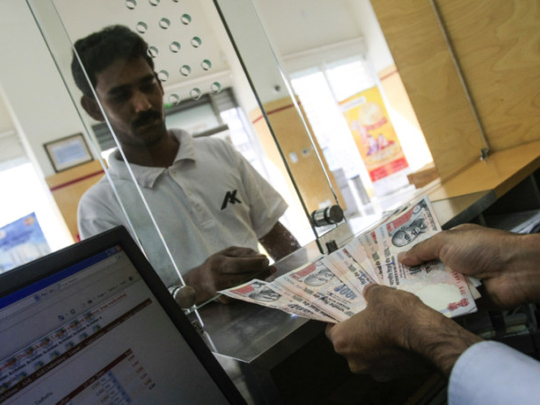
Dubai: Money exchange houses in the UAE are seeing an increase in remittances as the Indian rupee continues to take a beating from the US dollar.
The Asian currency continued to plummet on Wednesday, hitting 18.58 against the UAE dirham, the lowest in 16 months.
The decline was recorded ahead of the release of the US Federal Reserve meeting’s minutes and could benefit the hundreds of thousands of Indian expatriates in the UAE.
“I haven’t seen the rupee fall this much since about two years ago,” said one manager of an exchange outlet in Bur Dubai.
“We are expecting the transaction numbers to spike this evening and over the next few days when salaries of many workers are due to be released,” the source told Gulf News.
The Indian currency has been on a downward path since last year, owing to higher oil prices and stronger US dollar. “The Indian currency is under severe pressure due to the crude oil prices that increased to $80 per barrel for the first time in four years,” Sudhesh Giriyan, COO of Xpress Money said.
Giriyan said money transfer transactions by Indian expatriates have increased recently as remitters take advantage of favourable exchange rates. A weaker rupee means stronger remittance power for Indian expats.
“In the last one month, we have seen a significant rise in remittances to [India and the funds are] mainly from the white-collar segment,” Giriyan added.
India was the biggest beneficiary of money transfers last year, receiving a total of $69 billion (Dh253 billion) in funds from migrant workers around the world.
The second biggest chunk of remittances, amounting to $64 billion, went to China, followed by the Philippines, which received $33 billion. Mexico, Nigeria and Egypt were also among the six top recipients of expat earnings, receiving a total of $31 billion, $22 billion and $20 billion, respectively.
According to Giriyan, expat professionals in the UAE are usually the ones who take advantage of good exchange rates, and they tend to time their money transfers when the rates work in their favour.
“The white-collar segment has a keen eye on the exchange rates. They remit money when it is favourable to them. The money sent back home is not time-bound and so they save money and remit larger amounts in every two to three months,” Giriyan said.
“The blue-collar workers, on the other hand, remit money on a monthly basis as they need to provide money which helps their families manage the day to day expenditures.”







